人教版初中英语九年级U14单元
- 格式:doc
- 大小:89.50 KB
- 文档页数:10
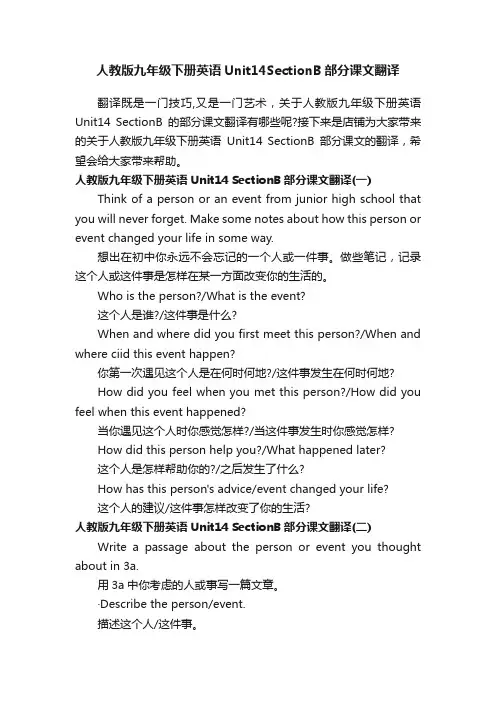
人教版九年级下册英语Unit14SectionB部分课文翻译翻译既是一门技巧,又是一门艺术,关于人教版九年级下册英语Unit14 SectionB的部分课文翻译有哪些呢?接下来是店铺为大家带来的关于人教版九年级下册英语Unit14 SectionB部分课文的翻译,希望会给大家带来帮助。
人教版九年级下册英语Unit14 SectionB部分课文翻译(一) Think of a person or an event from junior high school that you will never forget. Make some notes about how this person or event changed your life in some way.想出在初中你永远不会忘记的一个人或一件事。
做些笔记,记录这个人或这件事是怎样在某一方面改变你的生活的。
Who is the person?/What is the event?这个人是谁?/这件事是什么?When and where did you first meet this person?/When and where ciid this event happen?你第一次遇见这个人是在何时何地?/这件事发生在何时何地?How did you feel when you met this person?/How did you feel when this event happened?当你遇见这个人时你感觉怎样?/当这件事发生时你感觉怎样?How did this person help you?/What happened later?这个人是怎样帮助你的?/之后发生了什么?How has this person's advice/event changed your life?这个人的建议/这件事怎样改变了你的生活?人教版九年级下册英语Unit14 SectionB部分课文翻译(二) Write a passage about the person or event you thought about in 3a.用3a中你考虑的人或事写一篇文章。
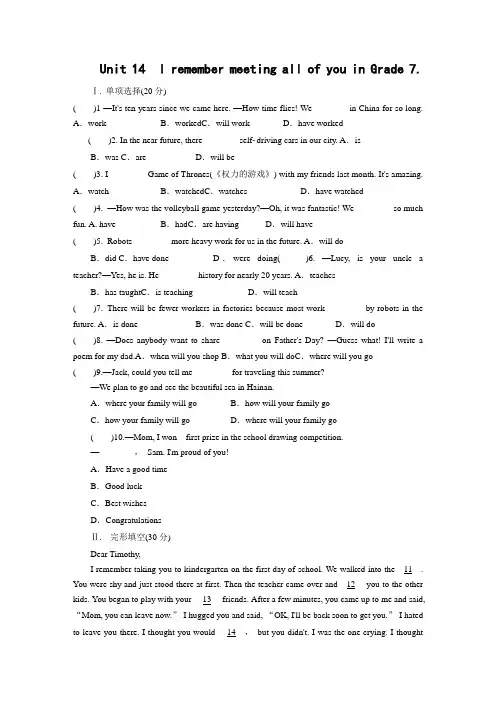
Unit 14 I remember meeting all of you in Grade 7.Ⅰ. 单项选择(20分)()1 —It's ten years since we came here. —How time flies! We________ in China for so long. A.work B.workedC.will work D.have worked()2. In the near future, there________ selfdriving cars in our city. A.isB.was C.are D.will be()3. I ________ Game of Thrones(《权力的游戏》) with my friends last month. It's amazing. A.watch B.watchedC.watches D.have watched()4.—How was the volleyball game yesterday?—Oh, it was fantastic! We ________ so much fun. A. have B.hadC.are having D.will have()5.Robots ________ more heavy work for us in the future. A.will doB.did C.have done D.were doing()6. —Lucy, is your uncle a teacher?—Yes, he is. He ________ history for nearly 20 years. A.teachesB.has taughtC.is teaching D.will teach()7.There will be fewer workers in factories because most work ________ by robots in the future. A.is done B.was done C.will be done D.will do()8. —Does anybody want to share ________ on Father's Day? —Guess what! I'll write a poem for my dad.A.when will you shop B.what you will doC.where will you go()9.—Jack, could you tell me ________ for traveling this summer?—We plan to go and see the beautiful sea in Hainan.A.where your family will go B.how will your family goC.how your family will go D.where will your family go()10.—Mom, I won first prize in the school drawing competition.—________,Sam. I'm proud of you!A.Have a good timeB.Good luckC.Best wishesD.CongratulationsⅡ. 完形填空(30分)Dear Timothy,I remember taking you to kindergarten on the first day of school. We walked into the__11__. You were shy and just stood there at first. Then the teacher came over and__12__ you to the other kids. You began to play with your __13__ friends. After a few minutes, you came up to me and said, “Mom, you can leave now.”I hugged you and said, “OK, I'll be back soon to get you.”I hated to leave you there. I thought you would __14__,but you didn't. I was the one crying. I thoughtabout __15__ the whole time you were gone. When I came to get you, you were so __16__ and told me all about your day. Your eyes were so bright and you didn't stop talking until we got back home.I can't believe that I will __17__watch you be handed your high school diploma(毕业文凭). You've worked so hard to get to this point. I'm proud of you. Today is your day to shine.I'm sad that you will join the army__18__ gradu-ation, but I know this is what you want. I will be worried about you and miss you.I'm not a perfect __19__. I've made some mistakes and I know these mistakes have __20__ you. I'm so sorry and I hope you can forgive me.Even though today is the day I have to let you go to discover the world on your own, please know that I'll be with you no matter where you go. I'll be there anytime and anywhere you may need me. I love you, my son.Yours,Mom()11.A.meeting room B.living room C.classroom D.kitchen()12.A.provided B.offered C.separated D.introduced ()13.A.new B.old C.smart D.beautiful()14.A.dance B.talk C.smile D.cry()15.A.you B.him C.her D.them()16.A.sad B.nervous C.excited D.angry()17.A.just B.yet C.already D.soon()18.A.while B.until C.after D.before()19.A.mother B.father C.teacher D.student()20.A.supported B.mentioned C.helped D.hurtⅢ.阅读理解(20分)Ladies and gentlemen,On this beautiful Friday afternoon, every one of us is excited and pleased to be in the school graduation ceremony for the class of 2017. It's my great honor to be here for my speech.As part of this year's class, I remember the fascinating days I spent with my friends and teachers during the past three years. We worked hard to be ready to graduate, but we didn't do it alone. We should thank all these following people.To our teachers, thank you for sharing your time, talent and knowledge with us. Yes, we know it was your job to do it, but you went beyond(超出……范围) he call of your duty. You always explained lessons to us patiently. You allowed us to enter your office after school for help when you could go home. You always kept encouraging us whenever we wanted to give up. You taught us so much about life.To our parents, thank you for supporting us in more ways than it's possible to count. You woke us up each morning and made sure we were well fed and clothed for school. You helped us with ourhomework, paid our school fees, and listened to our complaints. You always tried to give us enough space to learn how to work things out by ourselves. You really did so much for us.To our school guards and cleaners, thank you for keeping our school safe and clean. Just because of you all, we could have a comfortable environment to study and live in.To our principal and other school leaders, thank you for keeping things running so smoothly that our teachers could concentrate on us.As you can see, behind each graduate there are so many great people who supported them a lot. The best way we graduates can show our thanks is to work harder for our nation and society in the future.Thank you.()21.What does the underlined word “it”refer to?A. Preparing for the graduation ceremony.B.Spending time with friends and teachers.C.Studying hard to be prepared for graduation.D.Dealing with problems in study.()22.What does the underlined sentence in the third paragraph mean?A. The teachers were always very strict with their students.B.The teachers always used their power to give students orders.C.The teachers always did more than they should do to help students.D.The teachers didn't perform their duties well enough.()23.What does the speaker think of all the people mentioned in his speech?A. Lovely. B.Helpful. C.Patient. D.Creative.()24.What is the main idea of Paragraph Three to Paragraph Six?A. What the graduates will do to thank all the people who helped them.B.The responsibilities of the people who helped the graduates.C.The great things different groups of people did for the graduates' life.D.The reasons why the graduates show thanks to different groups of people.()25.What can we infer(推断) from the passage?A. The speaker used to complain about his life to his friends.B.The speaker used to spend some hard time in his school years.C.The speaker thought their success came from many people's support.D.The speaker suggested that the principal should get a special kind of prize.Ⅳ.书面表达(30分)转眼间,初中生活已经过去两年多。
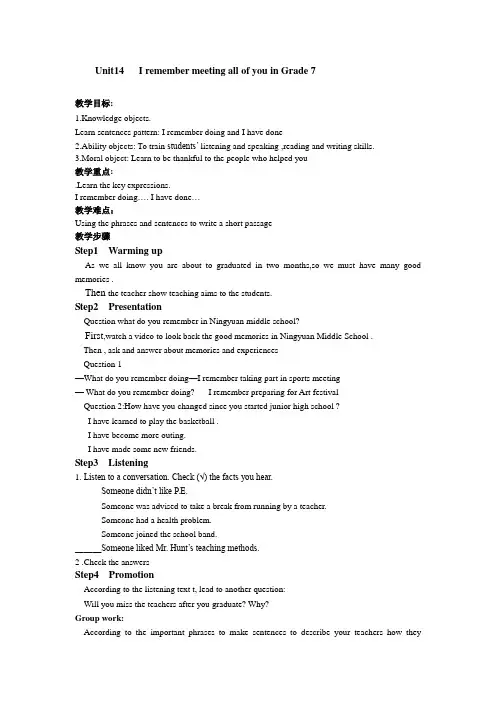
Unit14 I remember meeting all of you in Grade 7教学目标:1.Knowledge objects.Learn sentences pattern: I remember doing and I have done2.Ability objects: To train students’ listening and speaking ,reading and writing skills.3.Moral object: Learn to be thankful to the people who helped you教学重点:.Learn the key expressions.I remember doing…. I have done…教学难点:Using the phrases and sentences to write a short passage教学步骤Step1 Warming upAs we all know you are about to graduated in two months,so we must have many good memories .Then the teacher show teaching aims to the students.Step2 PresentationQuestion what do you remember in Ningyuan middle school?First,watch a video to look back the good memories in Ningyuan Middle School .Then , ask and answer about memories and experiencesQuestion 1—What do you remember doing—I remember taking part in sports meeting— What do you remember doing? ----I remember preparing for Art festivalQuestion 2:How have you changed since you started junior high school ?I have learned to play the basketball .I have become more outing.I have made some new friends.Step3 Listening1.Listen to a conversation. Check (√) the facts you hear._____Someone didn’t like P.E.______Someone was advised to take a break from running by a teacher.______Someone had a health problem.______Someone joined the school band.______Someone liked Mr. Hunt’s teaching methods.2 .Check the answersStep4 PromotionAccording to the listening text t, lead to another question:Will you miss the teachers after you graduate? Why?Group work:According to the important phrases to make sentences to describe your teachers how theyhelped you ?ask…for help 向…求助l et ….down 使失望be thankful to 对某人心存感激be busy with 忙于某事care about 关心look forward to 盼望…..be patient with 对….. 有耐心be responsible for 对…..负责任encourage sb to do sth 鼓励某人做某事◆I remember that teachers helped us play the game on the playground.◆I remember that the teachers were patient with us◆I remember that the teachers were responsible for all of the students◆I remember that the teachers encouraged me to do better next time when I failed theexam.◆I remember that the teachers cared about me when I was in troubleStep5 WritingTry to make a passage according to the picture and the given wordsI will miss my teachers because I remember in the self-teaching class, I met some difficulties on my study. Everyone was busy with his homework. So I remember asking the teacher for help. At first, I couldn’t understand what she said. The teacher spent time explaining things to me. I finally solved it. I felt really happy.Step6 Estimate and summaryI remember doing…I have doneStep7 Homework1. Finish your passage .2. Do exercise book .。
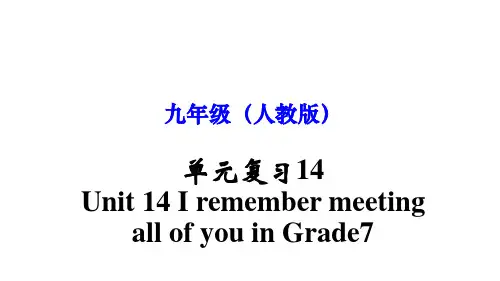
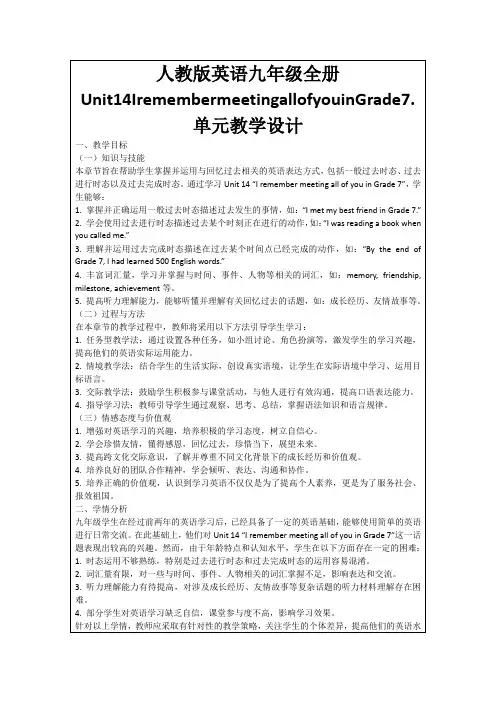
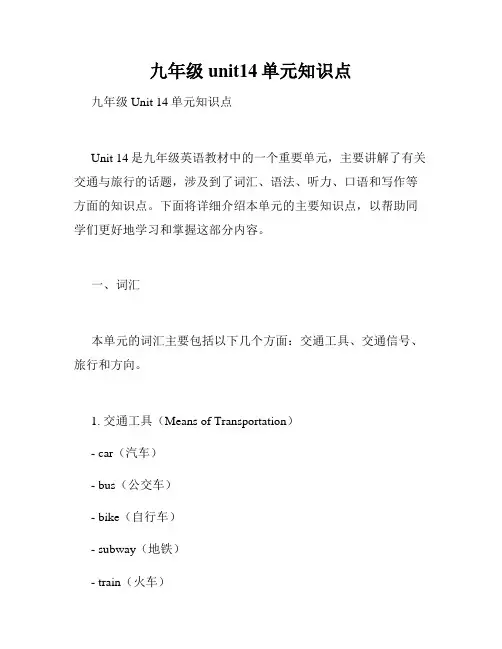
九年级unit14单元知识点九年级Unit 14单元知识点Unit 14是九年级英语教材中的一个重要单元,主要讲解了有关交通与旅行的话题,涉及到了词汇、语法、听力、口语和写作等方面的知识点。
下面将详细介绍本单元的主要知识点,以帮助同学们更好地学习和掌握这部分内容。
一、词汇本单元的词汇主要包括以下几个方面:交通工具、交通信号、旅行和方向。
1. 交通工具(Means of Transportation)- car(汽车)- bus(公交车)- bike(自行车)- subway(地铁)- train(火车)- plane(飞机)- ship(船)2. 交通信号(Traffic Signs)- traffic light(红绿灯)- stop sign(停车标志)- yield sign(让行标志)- pedestrian crossing(人行横道)- speed limit(限速标志)3. 旅行(Travel)- trip(旅行)- journey(旅程)- tourist(游客)- passport(护照)- luggage(行李)- ticket(车票/机票)4. 方向(Directions)- north(北)- south(南)- east(东)- west(西)- turn left(左转)- turn right(右转)- go straight(直走)二、语法本单元的语法部分主要涉及到情态动词的用法和一般现在时的被动语态。
1. 情态动词(Modal Verbs)- must(必须)- can(能够)- may(可能)- should(应该)- might(可能)2. 一般现在时的被动语态(Passive Voice in Simple Present)- 主语 + am/is/are(be动词的相应形式)+ 过去分词三、听力与口语通过听力和口语练习,同学们可以提高他们的听力理解和口语表达能力,使他们更好地运用所学知识。
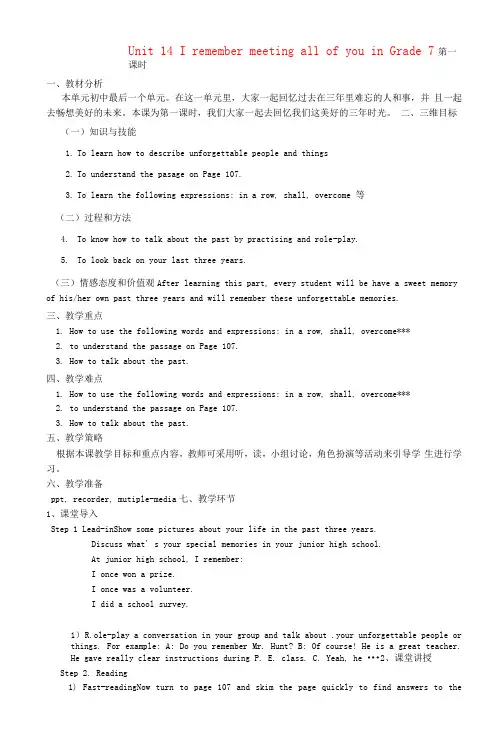
Unit 14 I remember meeting all of you in Grade 7第一课时一、教材分析本单元初中最后一个单元。
在这一单元里,大家一起回忆过去在三年里难忘的人和事,并且一起去畅想美好的未来。
本课为第一课时,我们大家一起去回忆我们这美好的三年时光。
二、三维目标(一)知识与技能1.To learn how to describe unforgettable people and things2.To understand the pasage on Page 107.3.To learn the following expressions: in a row, shall, overcome 等(二)过程和方法4.To know how to talk about the past by practising and role-play.5.To look back on your last three years.(三)情感态度和价值观After learning this part, every student will be have a sweet memory of his/her own past three years and will remember these unforgettabLe memories.三、教学重点1.How to use the following words and expressions: in a row, shall, overcome***2.to understand the passage on Page 107.3.How to talk about the past.四、教学难点1.How to use the following words and expressions: in a row, shall, overcome***2.to understand the passage on Page 107.3.How to talk about the past.五、教学策略根据本课教学目标和重点内容,教师可采用听,读,小组讨论,角色扮演等活动来引导学生进行学习。
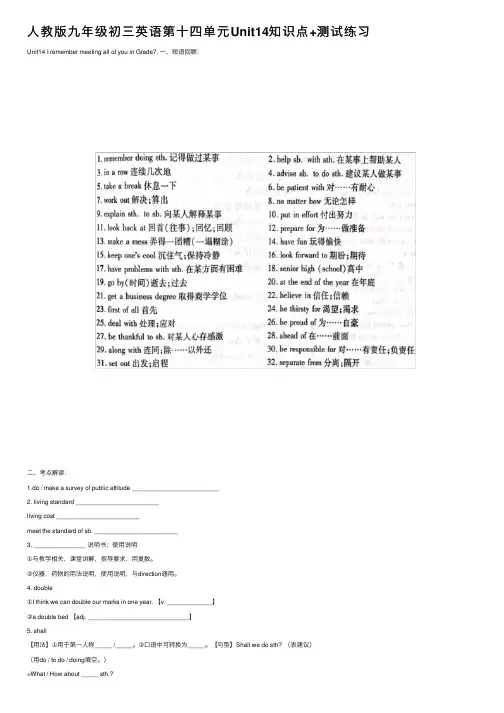
⼈教版九年级初三英语第⼗四单元Unit14知识点+测试练习Unit14 I remember meeting all of you in Grade7. ⼀、短语回顾:⼆、考点解读:1.do / make a survey of public attitude _________________________2. living standard ________________________living cost ________________________meet the standard of sb. ________________________3. _______________ 说明书;使⽤说明①与教学相关,课堂讲解,指导要求,⽤复数。
②仪器,药物的⽤法说明,使⽤说明,与direction通⽤。
4. double①I think we can double our marks in one year. 【v. _____________】②a double bed 【adj. _____________________________】5. shall【⽤法】①⽤于第⼀⼈称_____ /_____。
②⼝语中可转换为_____。
【句型】Shall we do sth?(表建议)(⽤do / to do / doing填空。
)=What / How about _____ sth.?=Why not _____ sth. / Why don’t _____ sth?=Would you like _____ sth? = You’d better _____ sth.=Let’s _____ sth. = Would you mind _____ sth.?6.overcome=get over _____;_________________________ 克服弱点____________________ 战胜困难7. make a mess of sth ____________________( be ) in mess___________ get into a mess___________get sb into a mess____________________ mess up_____8. graduate from________________ He graduated from Peking University.9. go 短语:go by ___________;___________ as time goes by, ..._____________________ go ahead ___________;________;_____ go off ___________go on______;______ What’s going on here?go up______go down______go over______10. manage to do sth. = succeed in doing sth.____________________15.degree 学位;程度;度数To do this job, you must have a degree in English.从事这个⼯作你必须有英语专业的⼤学学位。
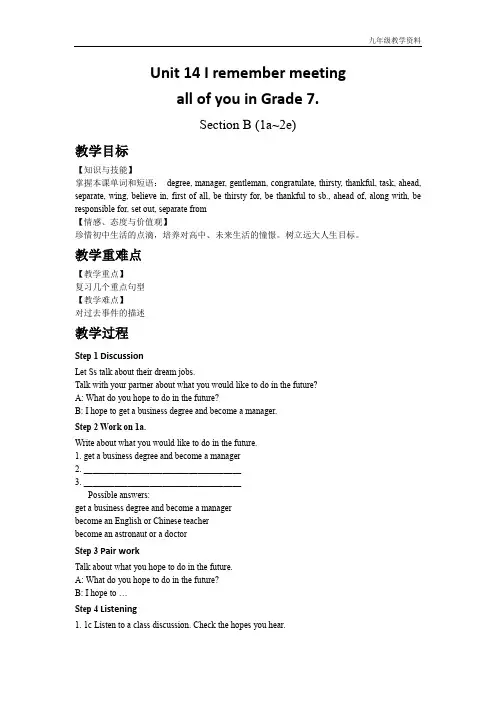
Unit 14 I remember meetingall of you in Grade 7.Section B (1a~2e)教学目标【知识与技能】掌握本课单词和短语:degree, manager, gentleman, congratulate, thirsty, thankful, task, ahead, separate, wing, believe in, first of all, be thirsty for, be thankful to sb., ahead of, along with, be responsible for, set out, separate from【情感、态度与价值观】珍惜初中生活的点滴,培养对高中、未来生活的憧憬。
树立远大人生目标。
教学重难点【教学重点】复习几个重点句型【教学难点】对过去事件的描述教学过程Step 1 DiscussionLet Ss talk about their dream jobs.Talk with your partner about what you would like to do in the future?A: What do you hope to do in the future?B: I hope to get a business degree and become a manager.Step 2 Work on 1a.Write about what you would like to do in the future.1. get a business degree and become a manager2. ____________________________________3. ____________________________________Possible answers:get a business degree and become a managerbecome an English or Chinese teacherbecome an astronaut or a doctorStep 3 Pair workTalk about what you hope to do in the future.A: What do you hope to do in the future?B: I hope to …Step 4 Listening1. 1c Listen to a class discussion. Check the hopes you hear.1) Write down the job name according to the pictures.2) Play the record and check the answers.1d Listen again and complete the passage.1) Let Ss understand the passage and write down some words meaning.Today is the students’ last class.Bob feels ______ about it and thinks Mrs. Chen’s classes have been ______. The students talk about what they want to do in the future. Bob hopes to _____ the exam to get into senior high school. Shirley wants to get into a _______ school.Ken is good at _______ and he won a _____ for it. So he wants to be a(n) _________.Mrs. Chen believes in all of them and tells them to “___________”. To celebrate the end of junior high, they are having a ________. They ask Mrs. Chen to come, and she is happy to accept the invitation.2) Play the tape. Check some of the answers but without making sure them all.3) Play the tape again. Let Ss listening carefully and pay attention to not sure part above. Check the answers.Answers: sad great pass music science prize astronautgo for it partyStep 5 PracticePrepare a speech for your graduation. Use the questions to help you.Present your speech to your group.How have you changed since you started junior high school?Who has helped you most?What advice have your parents given you?What will you do after you graduate?What are you looking forward to?1) Let Ss answer the questions one by one.2) Ask Ss to write down a passage according to the information above.3) Let some Ss read it out.Step 6 Reading1. 2b Read the passage and answer the questions.1) What kind of text is this? Is it a story, a speech or a notice?2) Who do you think wrote it?3) Who is it for?Possible answers:It is a speech.The principal of the school is probably the person who wrote it.It is for the graduating students of the school.2. 2c Read the passage again and answer the questions.1) What were the students like in Grade7?2) How have the students changed?3) Who should the students thank and why?4) What will senior high be like?5) How should the students deal with the future?6) What advice would you give to students who are just starting junior high school? Key: 1) They were all so full of energy and thirsty for knowledge.2) They are now talented young adults who are full of hope for thefuture.3) Their should thank the important people in their lives –their parents, teachers and friends – because these are the people who have helped and supported them.4) Life in senior high will be harder and they will have many difficult tasks ahead of them.5) They should learn from their mistakes and never give up, choose wisely and be responsible for their own decisions and actions, and not forget where they came from.2) It is always hard to separate from those whom you have spent so much time with for the past three years. However, we are still excited to ___________on a new journey when we enter senior high school.3) The teacher can see in our eyes that we ______________ knowledge. She tells us that knowledge will give us wings to fly.4) We will _____________ the junior high graduation ceremony tomorrow. It is a very special time for us.5) Our teachers and parents will __________ us because we have grown up and can be responsible for ourselves.Key: 1) none 2) set out 3) are thirsty 4) attend 5) be proud of2e Underline the sentences you like in the passage. Tell your partner what they mean and why you like them.Step 7 Language pointsThank you for coming today to attend the graduation ceremony at No. 3 Junior High graduation ceremony 毕业典礼You were all so full of energy and thirsty for knowledge.be full of 充满...e.g. Her life was full of excitement. 她的生活充满激动人心的事情。
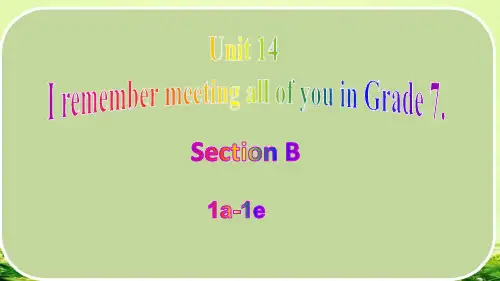
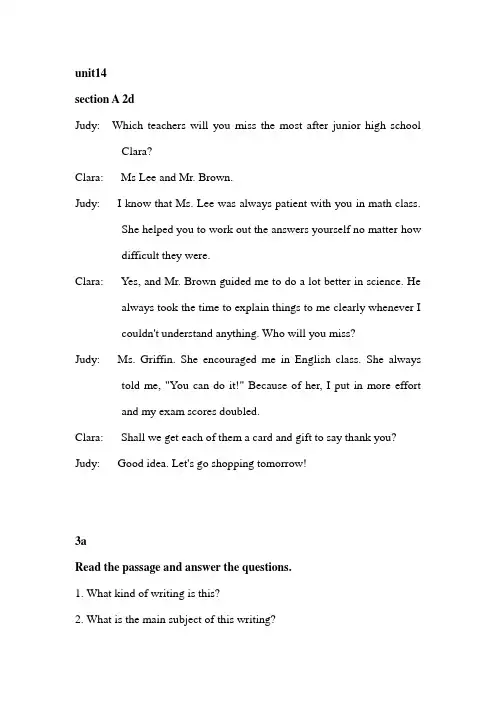
unit14section A 2dJudy: Which teachers will you miss the most after junior high school Clara?Clara: Ms Lee and Mr. Brown.Judy: I know that Ms. Lee was always patient with you in math class.She helped you to work out the answers yourself no matter howdifficult they were.Clara: Yes, and Mr. Brown guided me to do a lot better in science. He always took the time to explain things to me clearly whenever Icouldn't understand anything. Who will you miss?Judy: Ms. Griffin. She encouraged me in English class. She always told me, "You can do it!" Because of her, I put in more effortand my exam scores doubled.Clara: Shall we get each of them a card and gift to say thank you? Judy: Good idea. Let's go shopping tomorrow!3aRead the passage and answer the questions.1. What kind of writing is this?2. What is the main subject of this writing?3. Who do you think the writer is?I Remember Looking back at this past three yearsI remember many thingsTrying to be on time for morning readings Running when the lunch bell ringsI remember the excitementOf the school sports day each yearThe many long hours of trainingPride of overcoming fearI remember starting day oneThe shyest in my whole classNever speaking to anyoneAnd thinking I would not passThen slowly I made some new friendsTo remember foreverHelping each other with homework Getting better togetherPreparing for art festivalsAnd making a great big messHaving fun at New Year's parties Wishing everyone the bestThey have learned a different language That is from a foreign landEnglish brings many challengesWe work hard to understandAnd now it's time to graduateThey will leave all for lovely schoolI can't believe it's been three yearsI'm trying to keep my coolBut it's difficult not to cryI will miss the school trees and flowers And our kind and caring teachers Wonderful memories of ourssection B 2bRead the passage and answer the questions1. What kind of text is this? Is it a story, a speech or notice?2. Who do you think wrote it?3. Who is it for?Ladies and gentlemen,Thank you for coming today to attend the graduation ceremony at NO. 3 Junior High School. First of all, I'd like to congratulate all the students who are here today. I remember meeting all of you when you were just starting Grade 7 at the school. You were all so full of energy and thirsty for knowledge. And yes, some of you were a little difficult to deal with! But today, I see a room full of talented young adults who are full of hope for the future. You've all grown up so much and I'm so proud of you.Although you've all worked very hard over the last three years, none of you did it alone. I hope you'll remember the important people in your lives who helped and supported you-your parents, your teachers and your friends. Please consider what they've done for you and what they mean to you. Never fail to be thankful to the people around you.Lastly, the end of Junior high school is the beginning of a new life. I don'tneed to tell you that life in senior high school will be harder and that you have many difficult tasks ahead of you. You will make mistakes along the way, but the key is to learn from your mistakes and never give up. But along these difficulties, there will also be many exciting things waiting for you. Behind each door you open are 10 chances to learn new things, and you have the ability to make your own choices. Choose wisely and be responsible for your decisions and actions. Although you have to go with your separate ways now, I hope that in a few years' time you will come back to visit our school. As you set out on your new journey,you shouldn't forget where you came from. The future is yours.Good luck and hope to see you again sometime soon!。
U14 Have you packed yet? 语法:本单元主要是复习时态—现在完成时 构成:have/has + v过去分词 用法:详见下面语法分析。 重点短语 游泳衣,泳装 suit 主唱者 清理,清洁 有朝一日 day 立刻,马上 a minute 和某人道别say goodbye sb 旅行手册 在前十名 the ten 离开,走开 be 到目前为止 过一会再与某人通话 sb 在中国南部 in 和某人聊天 sb 幸亏,由于 劈材 woods 华侨 Chinese 生火做早饭 the fire breakfast 当地政府 在电视上演出be …的目的the … 在乐坛上 the music scene 盼望/期待做…look forward … 重点短语句型讲解 1. Sorry I couldn’t get back to you sooner. (P112)很抱歉我没能尽快给你回复。 这是在E-mail message回复中的常用语,句中“get back to sb”的意思是“以后再答复”。 I can’t give you a definite answer now but I’ll get back to you about it soon. 我现在不能给你一个明确的回答,但我很快会给你答复的。 2. In the past twelve months, they’ve had three major concerts and made a hit CD. 在过去的十二个月里,他们举办了三场较大的音乐会,出版了一张很受欢迎的CD唱片。 (1)“in the past+时间段”常用于完成时的句子中,表示“在过去的……时间里”,past是形容词,可以用last来替换,而past/last的后面通常要使用“数字+名词”的结构。 In the past/last two years, she has studied English very hard. 在过去的两年里,她一直在努力地学英语。 (2)短语make a hit表示“大获成功”、“(演出等)大受欢迎;受到赞扬”等,hit是名词,表示成功而风行一时的事物,如电影,歌曲,演出等。 Zhou Jielun has just made a hit CD. 周杰伦刚出版了一盘轰动一时的CD。 His song was a great hit. 他的歌曲轰动一时。 He made a great hit in teaching. 他曾在教学上获得了巨大的成功。 3. And then they’re going to go on a world tour in which they will perform in ten different cities. (P114)然后,他们将去世界各地旅行并在十个城市巡回演出。 ...in which they will perform in ten different cities是定语从句,先行词是tour,在关系代词which前介词in通常的位置是在动词perform的后面。本句为了避免与in two different cities短语中的in重复,将perform后的第一个in前置。句中perform 主要指扮演角色,演奏某种乐器,演出某一节目,侧重能力,技巧,效果,可用 作及物动词和不及物动词。 The magician performed wonderful tricks. 魔术师表演了精彩的魔术。 He performs perfectly on the piano. 他的钢琴演奏太棒了。 4. Be sure not to miss them if they come to a city near you — if you can get tickets, that is. (P114)如果他们来到你附近的城市,千万不要错过——当然,如果你能弄到票的话。 (1)句中的that is表示“确切地;换句话说;也就是”,用来表达一个准确的说法,即对前面的内容加以准确地说明。 She’s a housewife — when she’s not teaching English, that is. 她是个家庭主妇——是指她不教英语的时候。 (2)句中miss是“错过”,后接名词、代词或v-ing形式,不可接不定式。 They missed the train by two minutes.他们差两分钟没赶上火车。 I came late and missed seeing the beginning of the movie. 我来晚了,没有看见电影的开始部分。 miss还可表示“丢失”、“失去”,与lose同义。 5. ...but we really hope to have a number one hit some day. (P114)……但是我们真的希望有朝一日我们制作出能卖得最好的一首歌。 some day意为“将来某一日”,等于someday,与one day是近义词。some day/someday只表示将来,不表示过去。而one day用在过去时的句子里是“有一天”的意思,用在将来时的句子里是“将有一天”,与some day/someday可互换。 He will be a scientist some day.总有一天他会成为科学家。 I hope to see you one day/someday.我希望有一天会看到你。 One day last summer they made a trip to the country. 去年夏天某日他们到乡间旅行。 试译:你一定要有一天来看我。 You must come one day to see me. You must come some day to see me. You must come to see me someday. 他有一天来看了我。 误:He came some day to see me. 正:He came one day to see me. 6. ...as a part of the “In Search of Roots” summer camp program. (P116)……作为“寻根”夏令营活动的一部分。 in search for是固定短语,for 后面的名词同样必须是“寻找的目标”,不是“搜寻的对象”。search前常出现a 或one’s等词对search加以限定或修饰,这个短语也常作目的状语。 The soldiers were sent in a search for the missing aircraft. 士兵们被派去搜寻失踪的飞机。 So far, they have been unlucky in their search for gold and have no money at all. 到现在为止,他们寻找金子的运气一直不好,而且他们身上也没钱了。 知识拓展 search的基本用法 (1)search的动词用法。 ◎ search不与介词或副词搭配时是及物动词,表示“搜查”的意思,其后通常接处所或人物名词,表示搜查的对象。 He even searched my home without any reason. 他甚至毫无理由地搜查了我的家。 I’ve searched my memory, but can’t remember that man’s name. 我苦思良久,仍然记不起那人的名字。 They searched every part of the building. 他们对全楼进行了搜查。 ◎ search用不及物动词,后面接介词for 和after,构成及物性动词短语,两者是“搜寻,寻找”的意思,表示花费极大的气力去搜寻某个特定的目标,常含有对立或不对立的意味,两者可以通用,只不过search for 更常见些。 For a whole day they searched for/after the lost child. 他们找了一天这个丢失的孩子。 7. ...and so far has brought thousands of overseas Chinese students... (P116) ……到目前为止,它带来了成千上万的海外华裔学生…… so far 意思是“到目前为止”,常用于完成时,表示动作从过去开始一直延续到现在,强调到目前为止的情况,可位于句首,也可位于句末。 So far, no man has traveled farther than the moon. 到现在为止,还没有人到过比月球更远的地方。 How many travelers have been to Disneyland so far? 到现在为止有多少旅客到过迪斯尼乐园? So far we haven’t got any news from them. 到目前为止,我们还没有得到他们的任何消息。 8. Most, like Robert, can hardly speak any Chinese, and have never been to China before. (P116) 像罗伯特一样,大多数人几乎都不会说中文,而且以前从来没有到过中国。 (1)hardly是一个否定副词,表示“几乎不,简直不”,相当于almost not,含有否定的意义,故在句中不能另加否定词。切莫将hardly误认为是由hard+ly构成的副词。此外,hardly 位于句首时,要用倒装语序。 I hardly know what to say. 我简直不知道说什么好。 Hardly can I move this heavy desk. 我简直移不动这张重桌子。 — Can you catch what I said?你能听懂我说的话吗? — Sorry, I can hardly understand it.对不起,我几乎听不懂。 (2)have been后面接to表示某人“去过某地,现在已经回来了”,可用于各种人称。 Have you ever been to Shanghai? 你曾经去过上海吗? He has been to America twice. 他到美国去过两次。 have gone to与have been in的用法 have gone 表示某人“去某地了”,不论是在途中还是到了目的地,重点是强调这个人已经不在说话人所在的地方了,常用于第三人称;have been in,则表示一直“呆在某个地方”,常与表示一段时间状语连用。 Henry has gone to London. 亨利到伦敦去了。 They have been in Beijing for two weeks. 他们在北京已经有两个星期了。 9. Thanks to In Search of Roots... (P116)多亏“寻根”…… 【知识归纳】thanks, thanks to与thanks for的用法 ◎ thanks是名词thank的复数形式,意为“感谢”。表示“感谢”之意,可以说: Thanks a lot. Many thanks. A thousand thanks. ◎ thanks to是介词词组,后面可以接名词或代词,意为“多亏”;“由于”,在句中作原因状语。 Thanks to the old man, we found the lost child at last.